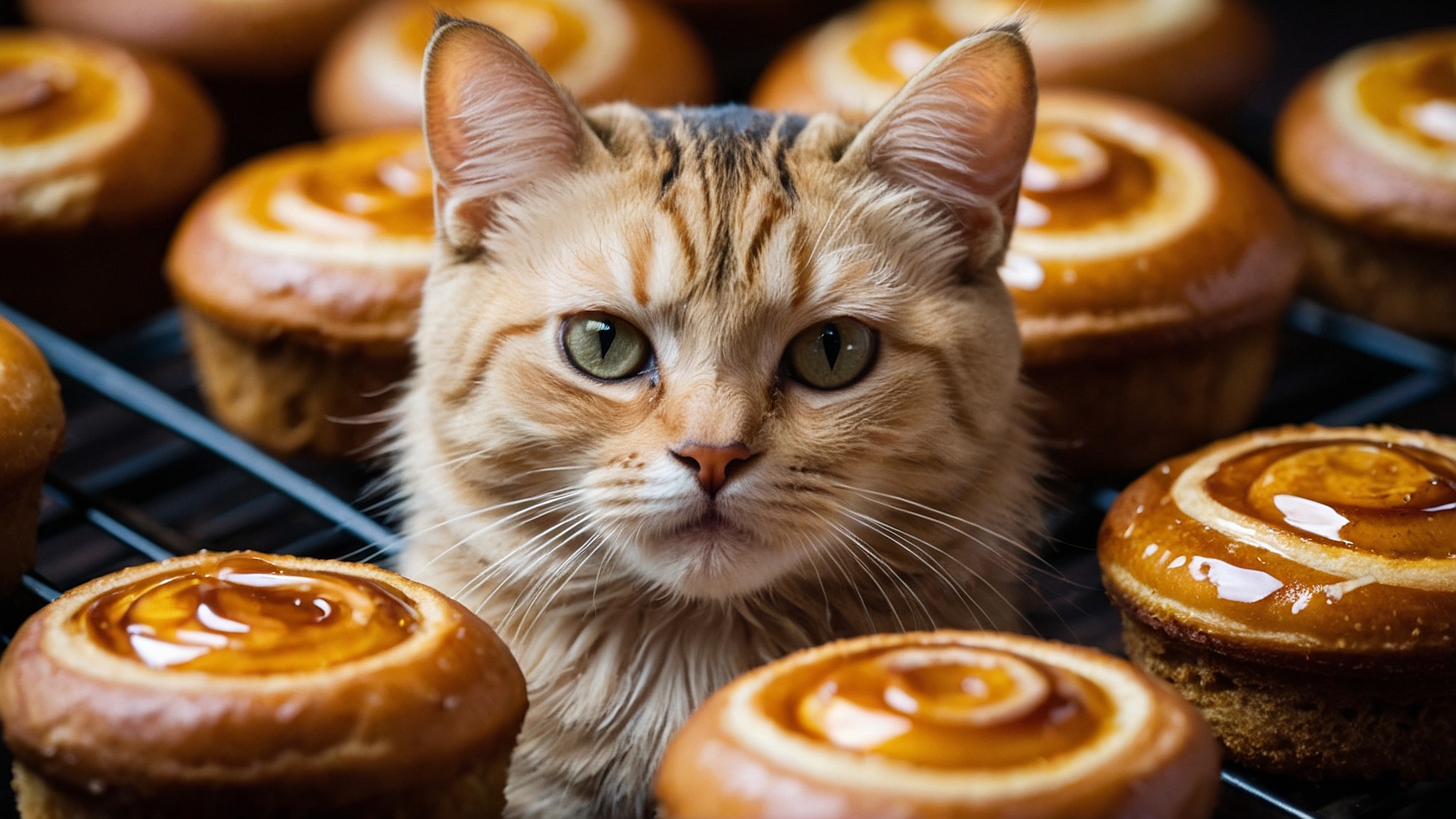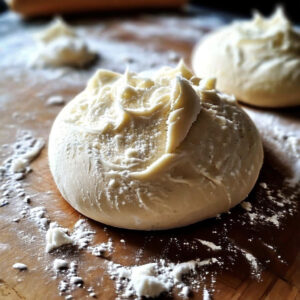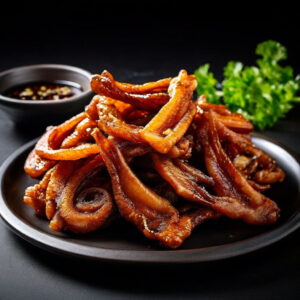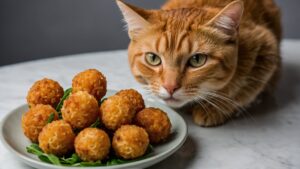Have you ever noticed your feline friend eyeing your honey bun with great interest? As you enjoy this sweet bakery item, it’s natural to wonder — can cats eat honey buns too?
Honey buns may look like a tasty treat to cats, but these baked goods are not a safe or healthy choice for your furry friend. Read on as we dive into whether cats can eat honey buns, examine the potential dangers, and offer safer snack alternatives for your kitty.
Table of Contents
What Are Honey Buns and Why Do Cats Want Them?
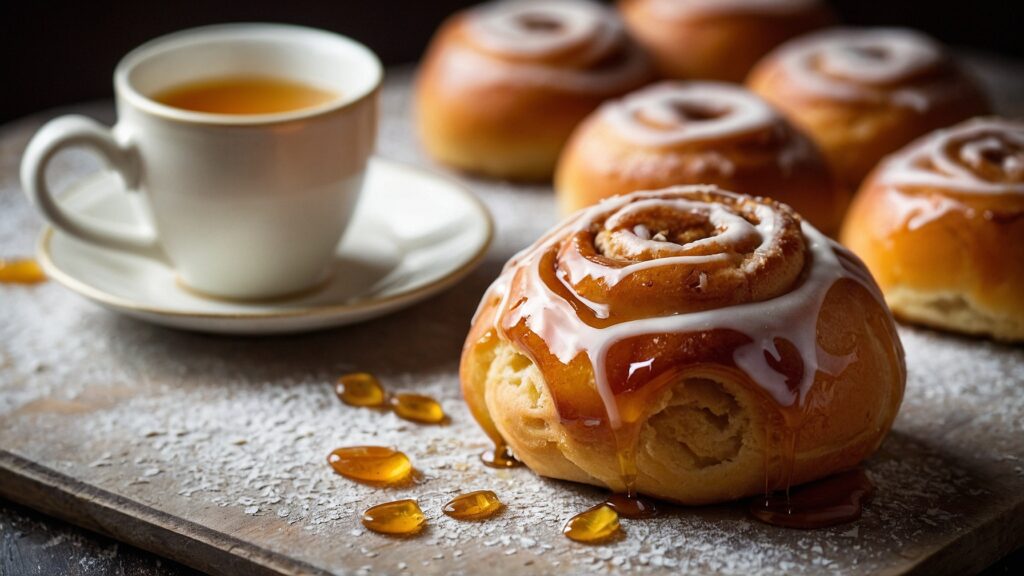
A honey bun is a popular commercial bakery item with a rich history dating back centuries. Modern honey buns are a sweet, sticky pastry made from ingredients like enriched flour, high fructose corn syrup, trans fats, and artificial flavors.
Here’s a quick look at the typical makeup of a honey bun:
| Ingredient | Why It’s Harmful for Cats |
|---|---|
| High fructose corn syrup | Too much sugar leads to obesity, diabetes |
| Enriched wheat flour | Hard to digest, no nutritional value |
| Palm oil, hydrogenated oil | Trans fats increase inflammation and heart disease risk |
| Artificial flavors | Toxic chemicals are unsafe for cats |
| Preservatives | Carcinogenic compounds damage cat’s liver and kidneys |
This sweet treat is designed to appeal to the human palate with its soft, pillowy dough and sticky, sugary glaze coating. As obligate carnivores, cats have no biological need for the carbohydrates or sugar found in baked goods. However, they can still be attracted to the strong sweet smells and enticing textures of treats like honey buns.
Cats use their sense of smell to assess foods. Even though honey buns hold no nutritional benefits for them, some cats may view these bakery items as an appealing snack simply based on scent and taste. As owners, it’s our job to understand why honey buns ultimately pose more risks than benefits for cats.
Can Cats Eat Honey Buns? Examining the Potential Dangers
Honey buns may smell tempting to cats, but these high-sugar, low-nutrient treats can be very dangerous if consumed by cats. Here are some of the top reasons vets recommend never feeding honey buns to your cat:
1. Extremely high sugar content
The main sweetening agents in honey buns are high fructose corn syrup and refined white sugar. While a serving of honey bun can satisfy a person’s sweet tooth, the concentrated sugar is excessive for small cats.
Eating too much sugar can lead to obesity, diabetes, dental decay, hyperactivity, anxiety, and other health issues in cats. The spike in blood glucose and insulin from high sugar foods stresses your cat’s body over time.
2. Harmful trans and saturated fats
Honey buns contain palm oil, hydrogenated oils, and other artery-clogging saturated fats. The American Heart Association warns that these unhealthy fats can negatively impact cardiovascular health in humans.
For cats, a diet with too much fat can lead to obesity, inflammation, and greater risk of heart disease. Unlike dogs, cats have a limited ability to metabolize saturated fats and trans fats, making honey buns a dangerous choice.
3. Non-nutritious fillers and artificial additives
Honey buns offer cats no protein, vitamins, minerals, or nutrients — only empty carbohydrates and calories. Fine-tuned to suit the human sweet tooth, these pastries are pumped full of artificial flavors, emulsifiers, stabilizers, and preservatives that are toxic for cats.
Consuming artificial chemicals can damage your cat’s organ function over time. Studies show additives like TBHQ preservative can cause liver abnormalities, kidney inflammation, convulsions, or labored breathing in cats.
4. Choking hazard from quick eating
Honey buns have a soft, chewy texture that cats may try to scarf down too quickly. Eating fast increases the risk of choking or intestinal blockages that can be life-threatening without swift veterinary treatment.
Cats are known for their quick, frenzied eating habits. Unlike dogs, cats do not chew food thoroughly before swallowing. Trying to gobble down a big mouthful of honey bun could lead to choking, throat obstruction, or other safety issues.
5. Can spark food begging and stealing behaviors
Giving honey buns teaches cats to beg for and steal people food. Felines that develop a taste for the sugars and flavors of human treats can become obsessed with procuring more when you aren’t looking.
Constant meowing, food theft, and inappropriate snacking are problems for overweight cats. Don’t start the habit of sharing sugary, fatty human treats with cats in the first place.
Can Cats Eat Honey? A Look at This Common Honey Bun Ingredient
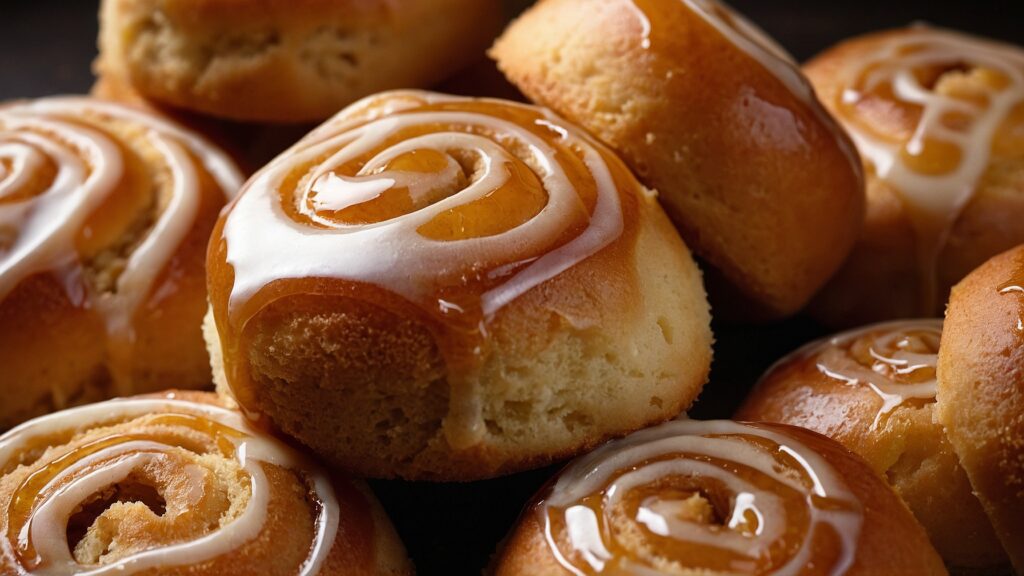
Honey buns get their signature sticky-sweet taste from honey. But what about just honey alone — can cats eat honey safely?
The answer is a qualified yes, but only in moderation. Here are some guidelines on feeding honey to cats:
- Too much honey also leads to obesity and diabetes. The high natural sugar content requires strict portion control for cats.
- Only feed small amounts on rare occasions. 1/2 teaspoon max of lightly honeyed food once a week is sufficient.
- Raw honey risks botulism poisoning. Raw honey may contain Clostridium botulinum spores that can multiply in a cat’s immature digestive system and release toxins. Pasteurized honey does not contain the bacteria.
- Kittens under 1 year old should avoid honey. Their developing immune and digestive systems are especially vulnerable to toxins.
While tiny quantities of honey once in a blue moon won’t necessarily harm an adult cat, it provides no complete nutrition. There are far healthier treats and foods to feed your cat for sound nutrition.
Healthy, Low-Calorie Treats for Cats
Instead of honey buns, reward your cat with treats specifically designed for feline health:
Meat-based protein treats
Cats thrive on high-protein, meat-based foods. Some healthy options:
- Cooked, unseasoned chicken or fish
- Commercial meat cat treats
- Freeze-dried raw cat foods
- Low-sodium deli meats
Vegetable snacks
Some cats enjoy small amounts of fruits and vegetables:
- Blueberries
- Slices of banana
- Shredded or steamed green beans
- Bits of apple or melon
- Baby carrots
Portion-controlled cat treats
Look for commercial cat treats that are:
- Grain-free
- Low in carbohydrates
- Made with natural ingredients
- Chewy texture to support dental health
- Calorie-controlled single servings
Check treats for a crude protein content of at least 30%. Avoid sugar, salt, onions, garlic, chocolate, and other unsafe human foods.
Signs Your Cat Accidentally Ate a Honey Bun
If your cat manages to sneak a honey bun while you weren’t looking, be alert for the following symptoms:
- Vomiting or diarrhea – A cat’s body tries to expel the foreign ingredients
- Hyperactivity or anxiety – Sugar overdose can induce this temporary state
- Lethargy – Feelings of illness from stomach upset
- Rapid weight gain – Quick spike in calories from sugar and fat
- Dental issues – Sugar feeds bacteria and causes gum inflammation, dental pain
If you suspect honey bun ingestion, call your vet. They can advise based on any symptoms the cat is exhibiting. Treatment depends on how much was ingested and how the cat’s body responds.
What to Do if Your Cat Eats a Honey Bun
Follow these steps if your cat manages to eat all or part of a honey bun:
1. Try to stay calm
Cats are very sensitive to their owner’s moods. While eating a honey bun is reason for concern, getting upset will only stress your cat out more.
2. Contact your veterinarian
Call your vet and describe how much honey bun the cat ate, when it happened, and any symptoms you’re observing. They will advise you on next steps and any home monitoring needed.
3. Monitor your cat closely
Watch for signs of illness like vomiting, lethargy, or anxiety. Make note of symptoms and timing as this helps the vet. Try to keep your cat rested and hydrated.
4. Avoid giving any more people food
Do not offer the cat any other human foods while ill, even if they act hungry. Stick to their normal cat food once symptoms resolve.
5. Consider temporary diet change
Your vet may recommend a bland diet like boiled chicken and white rice for 1-2 days to soothe your cat’s digestive upset.
The Verdict: Cats Cannot Safely Eat Honey Buns
Honey buns may look temptingly tasty to cats, but the dangers far outweigh any benefits. These sugar-packed treats can cause rapid weight gain in cats while providing zero complete nutrition.
- Here’s a quick summary of why cats and honey buns don’t mix:
- Extremely high in unhealthy fats and sugars
- Loaded with artificial chemicals toxic to cats
- Lead to obesity, diabetes, dental disease
- Choking risk from quick eating
- Encourage begging and food stealing
- The best practice is not feeding any human foods like honey buns to your cat without vet approval. While the occasional lick of honey won’t necessarily harm them, cats thrive on a meat-based diet and cat-safe commercial treats.
- With some training and vigilance while you enjoy your own sweet treats, you can keep your cat away from honey buns and other dangers lurking in human foods. Your furry friend depends on you for a balanced, nutritious diet tailored for long-term feline health.
Conclusion
In conclusion, honey buns may look tantalizingly sweet to curious kitties, but these high-calorie bakery treats pose more risks than benefits for cats. While the occasional tiny lick of honey is not necessarily harmful, honey buns contain concentrated sugars, unhealthy fats, and chemical additives that can cause digestive upset, obesity, diabetes, and other serious health issues in cats.
Resist sharing tastes of your honey bun, and instead show your cat some love with plenty of playtime and treats specially formulated for their meat-based nutritional needs. Your furry feline depends on you for a balanced diet and a long, happy life together. With knowledge of what human foods are dangerous, cat owners can help train their pets away from begging and stealing behaviors while keeping their unique systems healthy.
Frequently Asked Questions
Can kittens eat honey buns?
No. Kittens under one year absolutely should not eat any honey buns. Their developing digestive and immune systems cannot handle the high sugar load, fats, and chemicals.
What if my cat just licked a honey bun?
While a small lick likely won’t cause any major issues, try to prevent further tasting. The sugars could spark more interest and attempts to eat the entire thing.
Are honey buns safe for diabetic cats?
No. The concentrated sugars and refined carbohydrates in honey buns can dangerously spike blood sugar in diabetic cats. If your cat has diabetes, keep honey buns completely away from them.
Can I give my cat just a tiny bite of honey bun as a treat?
Veterinarians strongly advise against feeding any amount of honey bun to cats. Even tiny portions can lead to digestion issues, weight gain, begging behaviors, and other problems.
What if my cat ate most of a whole honey bun?
Contact your vet immediately if your cat managed to eat all or a large portion of a honey bun. Symptoms of sugar overdose and poisoning may occur, requiring prompt medical treatment.
References and Sources:
- Fetch By WebMD. Foods Your Cat Should Never Eat. https://www.webmd.com/pets/cats/ss/slideshow-foods-your-cat-should-never-eat
